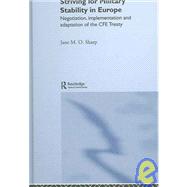Striving for Military Stability in Europe: Negotiation, Implementation and Adaptation of the CFE Treaty
, by Sharp; Jane M. O.- ISBN: 9780415354592 | 0415354595
- Cover: Hardcover
- Copyright: 1/13/2006
This study shows that arms control agreements reflect rather than affect relations between the parties. The Treaty on Conventional Armed Forces in Europe (CFE) codified parity between NATO and the Soviet-led Warsaw Treaty Organization (WTO) in November 1990. CFE thus reflected the status quo at the end of the cold war, but the benefits were short lived, at least for Russia. Although still widely viewed in the west as the cornerstone of security and stability in post-Cold War Europe, from the Russian perspective CFE was soon overtaken by events. With the collapse of the WTO and the Soviet Union in 1991, it became impossible to talk of a military balance between east and west in Europe, especially as all the former WTO states opted for membership in NATO. The other state parties worked hard to adjust and adapt the treaty to meet Russian concerns about its new weakness relative to NATO, but three sets of issues complicated Russian acceptance of CFE limits. The first was NATO enlargement which, thoughnot directed against Moscow, certainly underscored Russia's weakness relative to NATO. The second was Russia's heavy handed suppression of the Chechen independence movement, begun by Boris Yeltsin in 1994, which after September 11, 2001 President Putin rationalized as part of the global war on terrorism. Putin also used 9/11 as an excuse not to withdraw troops and equipment from Georgia a commitment made by Russia when the adapted CFE Treaty was signed in Istanbul in November 1999. The third was Russian opposition to increasingly aggressive US-led military operations in the post Cold War era: in the Balkans in the 1990s and against Iraq in 2003. Russia cooperated with the operation against the Taliban in Afghanistan in 2002, but was increasingly concerned with what appeared to be permanent US military bases in central Asia.







